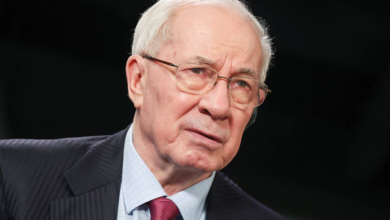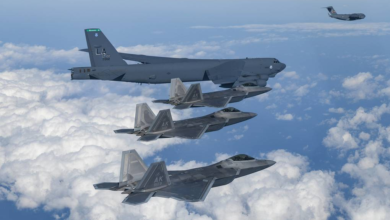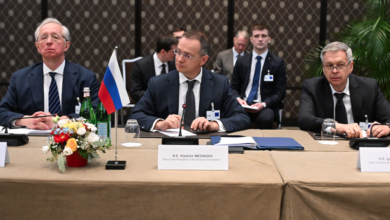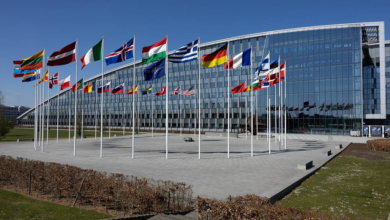Gaza on the Brink: Entire Population Faces Imminent Famine Amid Blockade and Conflict
Like always Israeli officials, for their part, deny that a hunger crisis exists
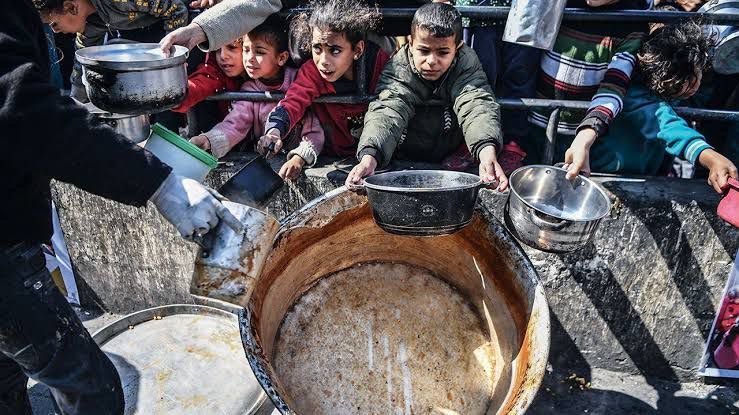
Gaza on the Brink: Entire Population Faces Imminent Famine Amid Blockade and Conflict
By Naira Manzoor
Gaza is teetering on the edge of a humanitarian catastrophe. A new report by the Integrated Food Security Phase Classification (IPC), a globally recognized hunger monitoring system used by the United Nations and aid organizations, has warned that the entire population of Gaza – 2.1 million people – is now at critical risk of famine. After 19 months of continuous conflict, destruction, and displacement, more than 500,000 people are already experiencing starvation, and experts say the worst may be yet to come.
According to the IPC, the famine threat in Gaza is no longer a theoretical risk, it’s rapidly becoming a reality. “The risk of famine in the Gaza Strip is not just possible, it is increasingly likely,” the report states. The warning comes as Gaza’s food systems have all but collapsed, with agriculture, markets, and supply chains devastated by repeated airstrikes and a suffocating blockade. Aid agencies on the ground report that some families are now surviving on animal feed, wild herbs, or nothing at all. Children are arriving at clinics with signs of acute malnutrition, and hospitals, crippled by a lack of fuel and medicine are unable to provide adequate care.
Since early March, Israel has enforced a near-total blockade on the entry of food, medical supplies, fuel, and other humanitarian necessities into Gaza. Israeli officials have said this is part of their strategy to pressure Hamas into releasing the remaining hostages believed to be held in Gaza. As of this writing, 58 hostages remain unaccounted for. However, humanitarian groups and international legal experts argue that this policy crosses a dangerous line. The blockade, they say, amounts to the weaponisation of humanitarian aid, turning food and medicine into bargaining chips. “This is not just a moral failing,” said one UN official. “It could be a war crime.”
Tom Fletcher, a senior coordinator in the UN’s Office for the Coordination of Humanitarian Affairs (OCHA), was blunt in his condemnation. In an interview with the BBC, Fletcher accused Israel of “weaponising food” and called on the international community to step in with urgency. “This is a deliberate policy,” he said. “Israel is choosing to use starvation as a tool of war. That is a line the world cannot allow to be crossed.” Fletcher also criticized Israel’s proposed system for aid distribution, calling it “a deliberate distraction designed to prolong the suffering and further harm civilians.”
The proposed aid corridors and drop zones introduced by Israel have also come under fire. Aid groups argue they are poorly coordinated, insufficient in scale, and ultimately ineffective. Worse, they say, these systems exclude some of Gaza’s most vulnerable populations – women, children, the elderly, the disabled, and the wounded, who cannot physically reach designated aid points. “If you can’t walk, if you’re injured, if you’re a mother with several children, you’re out of luck,” said one field worker with an international NGO. “This is not a system. It’s a PR stunt.”
Israeli officials, for their part, deny that a hunger crisis exists. They point to the quantity of aid that entered Gaza during the ceasefire in late 2024 as proof that humanitarian needs are being met. But the IPC report and numerous humanitarian organizations firmly dispute this claim. Since the blockade was tightened in March, the volume of aid entering Gaza has plummeted. UN convoys are routinely delayed or denied access, and critical infrastructure including bakeries, water systems, and hospitals has been bombed or rendered nonfunctional. With Gaza’s borders sealed and internal infrastructure shattered, the territory is unable to produce or distribute enough food to meet even the most basic needs of its people.
As Gaza plunges deeper into crisis, pressure is mounting on the international community to act. Aid agencies are calling for an immediate ceasefire, the reopening of border crossings for humanitarian convoys, and the establishment of a coordinated, neutral aid distribution system. “We are past the point of warnings,” said Fletcher. “We are watching a famine unfold in real time. The world must respond now, not in hindsight.” For the 2.1 million people trapped in Gaza, most of them civilians, the coming weeks could determine whether they survive or perish. The choice, experts say, is no longer about politics or military strategy. It’s about humanity.
